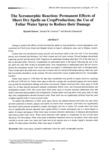The Xeromorphic Reaction: Permanent Effects of Short Dry Spells on CropProduction; the Use of Foliar Water Spray to Reduce their Damage
JIRCAS international symposium series
| ISSN | 13406108 |
|---|---|
| 書誌レコードID(総合目録DB) | AA1100908X |

本文フルテキスト
intlsymp-13_107-116.pdf1.33 MB
Aiming to analyze the effects of mild and short dry spells on crop production, several experiments were conducted on Chichi-jima Island and Ishigaki Island, in Japan's subtropical zone, and in Xinjian, western China.
Coarse-clod soil decelerated tomato growth and decreased yield in the first half of the harvesting period, and increased leaf thickness, leaf water content and soil water content. Plowed hardpan decelerated sugarcane growth and decreased yield. Sugarcane in undisrupted hardpan plots had 71 % of the leaf area of that in disrupted plots. However, transpiration in undisrupted plots in the month following the end of the dry spell was only 46% of that in disrupted plots. Poor transpiration in undisrupted plots did not recover during the subsequent month. Leaf water content was higher in undisrupted plots than in disrupted plots. These results show that mild water stress due to coarse-clod soil and plowed hardpan during a short dry spell had irreversible aftereffects on the stomata. We have named this course of plant behavior the 'xeromorphic reaction'.
Foliar water spray at 15:00 daily for nine days accelerated root growth in tomato; however, spraying at 9:00 and 12:00 did not. Foliar water spray in the late evening also accelerated papaya and sweet potato root growth but decelerated cabbage and melon root growth. Papaya receiving foliar water spray at 16:00 daily for 14 days showed increased stomata! conductance before noon, and increased photosynthesis and transpiration around 13:00. The results show foliar water spray to increase stomata! conductance first; this leads to increased photosynthesis and transpiration. Tomato plants receiving foliar water spray daily for nine days after transplantation showed increased yield. Their yield was not significantly different from the yield of plants supplied with 2.5 times as much water.
To analyze the difference in foliar water spray effects, the relation between leaf water loss and xylem pressure potential in tomato, papaya and melon cut leaves were compared. Leaf water loss significantly decreased xylem pressure potential in tomato and papaya, but less in melon. Our results show leaf water loss to significantly increase physical water uptake ability in tomato and papaya, but to a lesser degree in melon. In tomato and papaya, foliar water spray increases stomatal conductance. It enhances photosynthesis and reduces plant water stress. Water stress increases water uptake to compensate for loss of leaf water decreases. For these plants, foliar water spray is therefore beneficial. However, in melons, foliar water spray resulted in excess water loss, since leaf water loss in this species acts as a weaker signal to increase water uptake. For these plants, therefore, foliar water spray is harmful.
Coarse-clod soil decelerated tomato growth and decreased yield in the first half of the harvesting period, and increased leaf thickness, leaf water content and soil water content. Plowed hardpan decelerated sugarcane growth and decreased yield. Sugarcane in undisrupted hardpan plots had 71 % of the leaf area of that in disrupted plots. However, transpiration in undisrupted plots in the month following the end of the dry spell was only 46% of that in disrupted plots. Poor transpiration in undisrupted plots did not recover during the subsequent month. Leaf water content was higher in undisrupted plots than in disrupted plots. These results show that mild water stress due to coarse-clod soil and plowed hardpan during a short dry spell had irreversible aftereffects on the stomata. We have named this course of plant behavior the 'xeromorphic reaction'.
Foliar water spray at 15:00 daily for nine days accelerated root growth in tomato; however, spraying at 9:00 and 12:00 did not. Foliar water spray in the late evening also accelerated papaya and sweet potato root growth but decelerated cabbage and melon root growth. Papaya receiving foliar water spray at 16:00 daily for 14 days showed increased stomata! conductance before noon, and increased photosynthesis and transpiration around 13:00. The results show foliar water spray to increase stomata! conductance first; this leads to increased photosynthesis and transpiration. Tomato plants receiving foliar water spray daily for nine days after transplantation showed increased yield. Their yield was not significantly different from the yield of plants supplied with 2.5 times as much water.
To analyze the difference in foliar water spray effects, the relation between leaf water loss and xylem pressure potential in tomato, papaya and melon cut leaves were compared. Leaf water loss significantly decreased xylem pressure potential in tomato and papaya, but less in melon. Our results show leaf water loss to significantly increase physical water uptake ability in tomato and papaya, but to a lesser degree in melon. In tomato and papaya, foliar water spray increases stomatal conductance. It enhances photosynthesis and reduces plant water stress. Water stress increases water uptake to compensate for loss of leaf water decreases. For these plants, foliar water spray is therefore beneficial. However, in melons, foliar water spray resulted in excess water loss, since leaf water loss in this species acts as a weaker signal to increase water uptake. For these plants, therefore, foliar water spray is harmful.
| 作成者 | Kiyoshi Ozawa Samuel M. Contrers Hiroshi Fukamachi |
|---|---|
| 著者キーワード | foliar water spray stomatal conductance short dry spell xeromorphic reaction |
| 公開者 | Japan International Research Center for Agricultural Sciences |
| オンライン掲載日 | |
| 号 | 13 |
| 開始ページ | 107 |
| 終了ページ | 116 |
| 言語 | eng |
